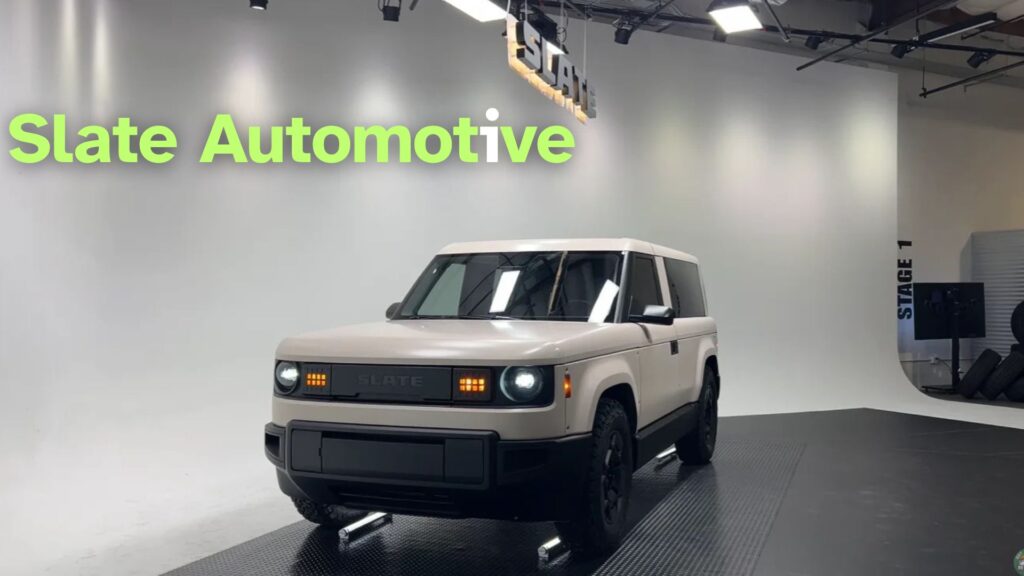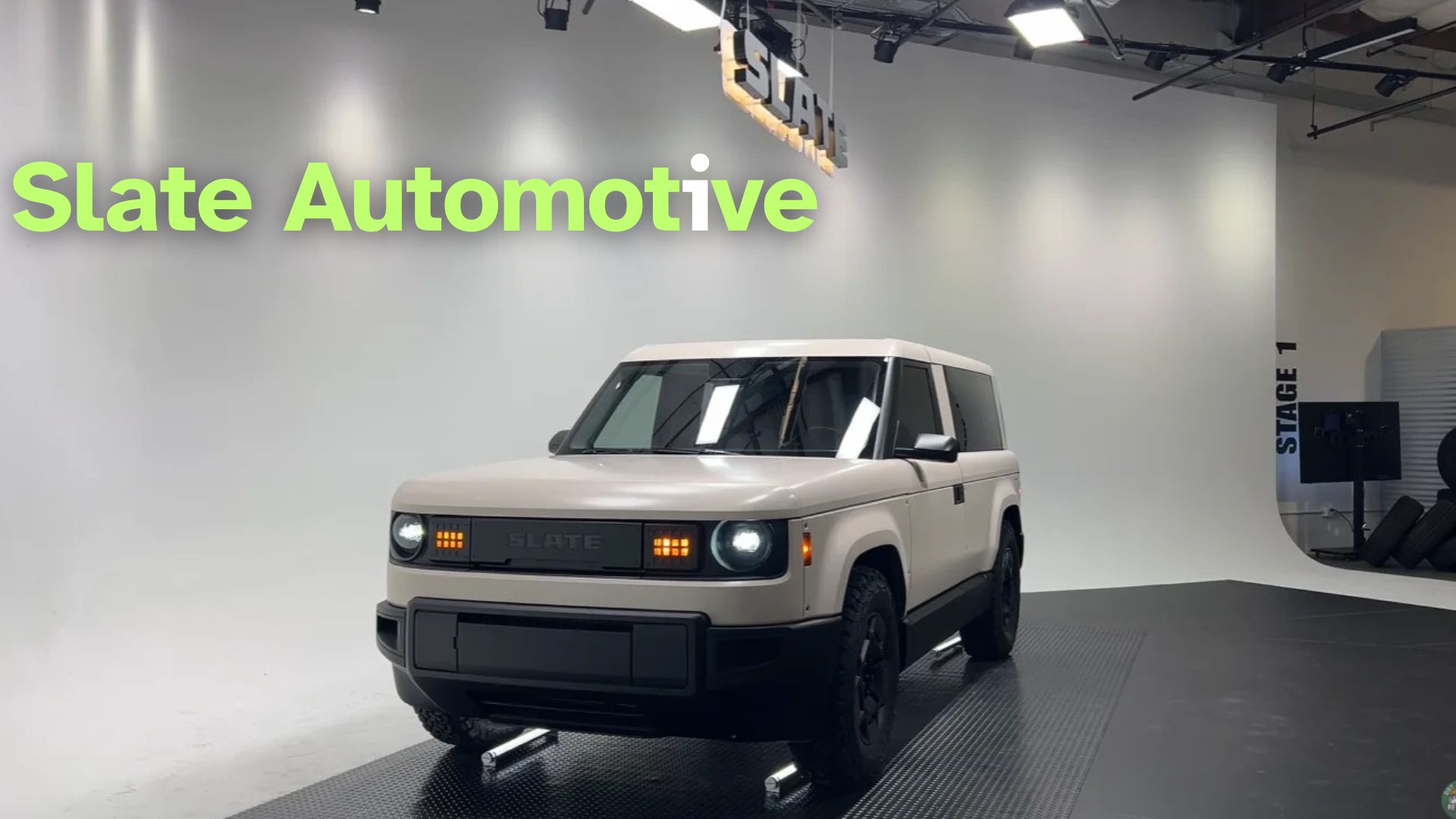The electric vehicle (EV) industry is in a transformative phase, shaped by changing consumer demand, policy rollbacks, and global tariffs. Against this backdrop, Slate Automotive, a startup backed by Amazon founder Jeff Bezos, is making waves with its ambitious plan to launch a fully customizable electric pickup truck that could cost under $30,000. The company claims to have cracked the code for affordable EV ownership by stripping down its vehicle to the essentials and allowing buyers to personalize it with add-ons and accessories.

Expected to debut in 2026, the Slate Truck could offer a significant alternative in a market where affordability remains the single largest barrier to EV adoption.
The Vision: Barebones but Customizable
Slate Automotive’s pitch is simple but radical: reduce manufacturing costs by keeping the truck as basic as possible, then give customers the freedom to build on it.
-
Basic Form: Two doors, two seats, and limited built-in features.
-
No Standard Infotainment System: Buyers can add it as an accessory.
-
Customization: More than 100 official accessories will be offered, ranging from advanced infotainment units to SUV conversion kits.
What makes Slate unique is its open-source approach. By encouraging third-party developers to create their own accessories, Slate envisions a modular EV ecosystem where owners can personalize their trucks endlessly.
Summary Table
Key Detail |
Information |
|---|---|
Company |
Slate Automotive |
Backed By |
Jeff Bezos |
Vehicle |
Slate Truck (compact EV pickup) |
Base Design |
2 doors, 2 seats, no infotainment by default |
Launch Year |
2026 |
Price (Post-Tax Credit Rollback) |
$27,000 – $28,000 |
Customization |
100+ official accessories; open-source for third-party add-ons |
Reservations |
100,000+ |
Competitors |
Ford Maverick, Mitsubishi Mirage, other sub-$30K models |
Official Site |
Why Affordability Matters Now
The average transaction price of a new vehicle in the United States hovers above $48,000, with EVs often costing even more. For many consumers, this makes EV ownership unattainable.
According to a May 2025 survey by J.D. Power, nearly half of American car shoppers identified sticker price as the biggest drawback of EVs.
Slate Automotive’s strategy directly addresses this concern. By starting around $27,000 to $28,000 (post federal incentive rollbacks), Slate positions itself as one of the most affordable EVs in the U.S. market.
Federal Policy Shifts: The Tariff and Tax Credit Challenge
Slate’s launch timing coincides with a significant shift in U.S. EV policy under President Donald Trump’s administration:
-
Tariffs on Foreign Automakers: These have made imported EVs more expensive.
-
Rollback of Federal Incentives: In July 2025, an executive order slashed the $7,500 federal EV tax credit, which had previously brought Slate’s advertised price below $20,000.
By September 2025, these credits are set to expire entirely. Slate, however, maintains that its sub-$30,000 pricing will remain compelling even without federal support.
Reservation Numbers: Consumer Interest Is Strong
Despite uncertainties in pricing and policy, Slate Automotive has already received more than 100,000 reservations for its compact, barebones truck. This signals strong consumer interest in an affordable, American-made EV, especially in a market dominated by high-priced models.
Competitive Landscape: Can Slate Deliver?
The critical question is whether the Slate Truck can remain attractive at $27,000 to $28,000, compared to other vehicles in the sub-$30,000 range.
-
Ford Maverick: Priced just below $30,000, available in both ICE and hybrid models, and comes with many built-in features absent in Slate’s base design.
-
Mitsubishi Mirage: Currently the only U.S. vehicle priced under $20,000, though it is a small gasoline-powered car.
-
Other Affordable Options: Cox Automotive reports about 20 models in the sub-$30,000 segment, highlighting the competitive challenge Slate faces.
Market analysts like Sam Abuelsamid, Vice President of Market Research Telemetry, caution that Slate may need to further reduce prices to compete effectively. However, doing so could eat into already thin profit margins.
What Makes Slate Different?
Unlike traditional automakers, Slate is betting on a modular, open-source business model:
-
Owners can expand the vehicle into a 5-seat SUV using a conversion kit.
-
Third-party innovators can design add-ons, similar to how smartphone accessories fuel an ecosystem.
-
Customization could extend beyond aesthetics into functionality, turning the truck into a work vehicle, family SUV, or lifestyle product.
This “build-it-yourself” model could appeal to a wide range of consumers from budget-conscious buyers to tech enthusiasts eager to personalize their EV.
The Road Ahead
The big challenge for Slate Automotive is balancing affordability, functionality, and profitability. While the company’s innovative approach and Bezos-backed funding provide credibility, the real test will be whether consumers are willing to pay close to $30,000 for a barebones truck when competitors offer more features for a similar price.
If Slate can scale production and successfully build an accessory-driven ecosystem, it may very well reshape the EV market by proving that customization and affordability can go hand in hand.
Frequently Asked Questions (FAQs)
1. What is Slate Automotive?
A. Slate Automotive is an American EV startup backed by Jeff Bezos. It focuses on affordable, customizable electric pickup trucks.
2. How much will the Slate Truck cost?
A. The company expects the truck to be priced around $27,000 to $28,000 after federal EV tax credits expire in 2025.
3. When will the Slate Truck launch?
A. Slate Automotive plans to launch the vehicle in 2026.
4. How customizable is the Slate Truck?
A. Very. Buyers can choose from over 100 official accessories, including a 5-seat SUV conversion kit. The vehicle is also open-source, allowing third parties to design their own add-ons.
5. How many reservations have been made so far?
A. More than 100,000 reservations have been recorded for the truck.
6. What makes Slate different from other EV makers?
A. Slate’s modular, open-source approach allows owners and third-party developers to personalize the truck extensively, something not offered by traditional automakers.
For More Information Click HERE.
